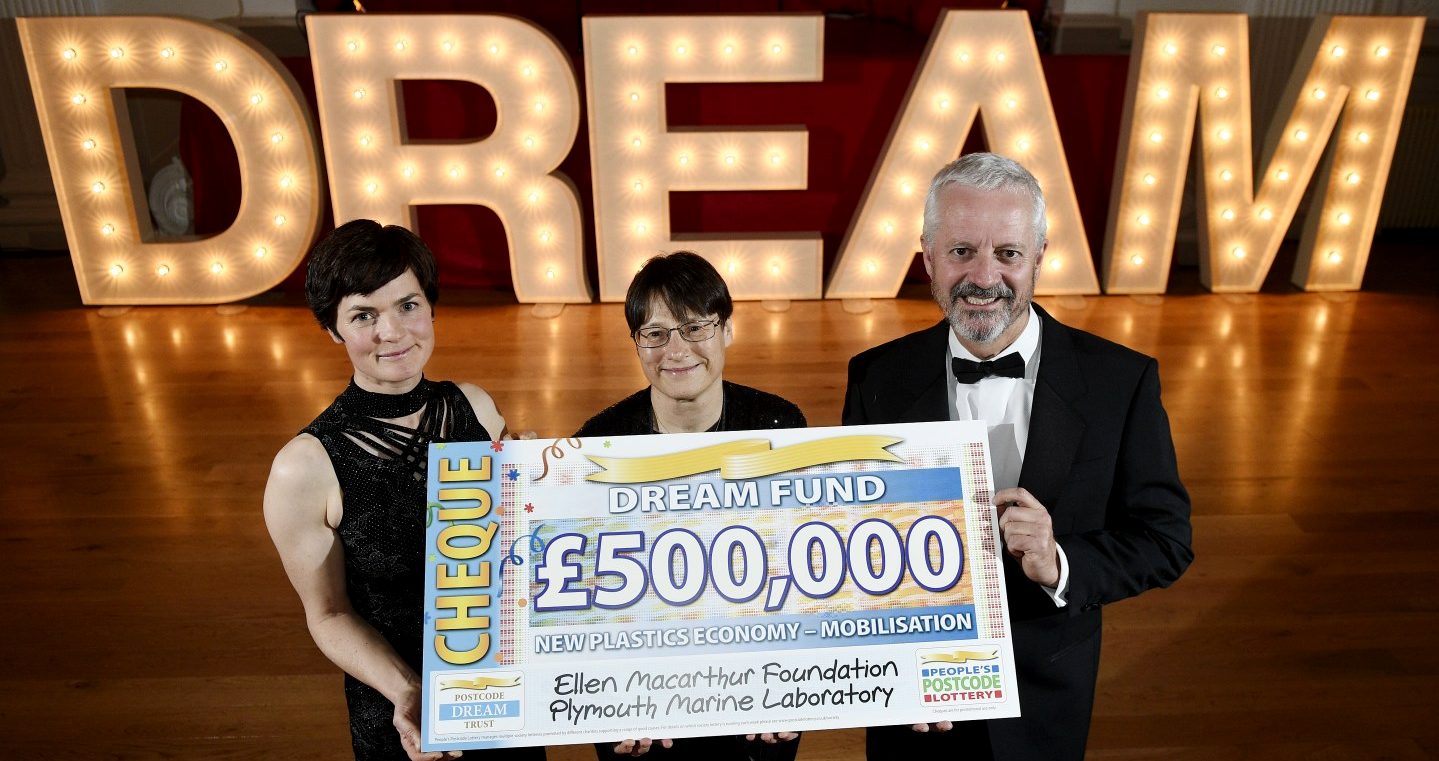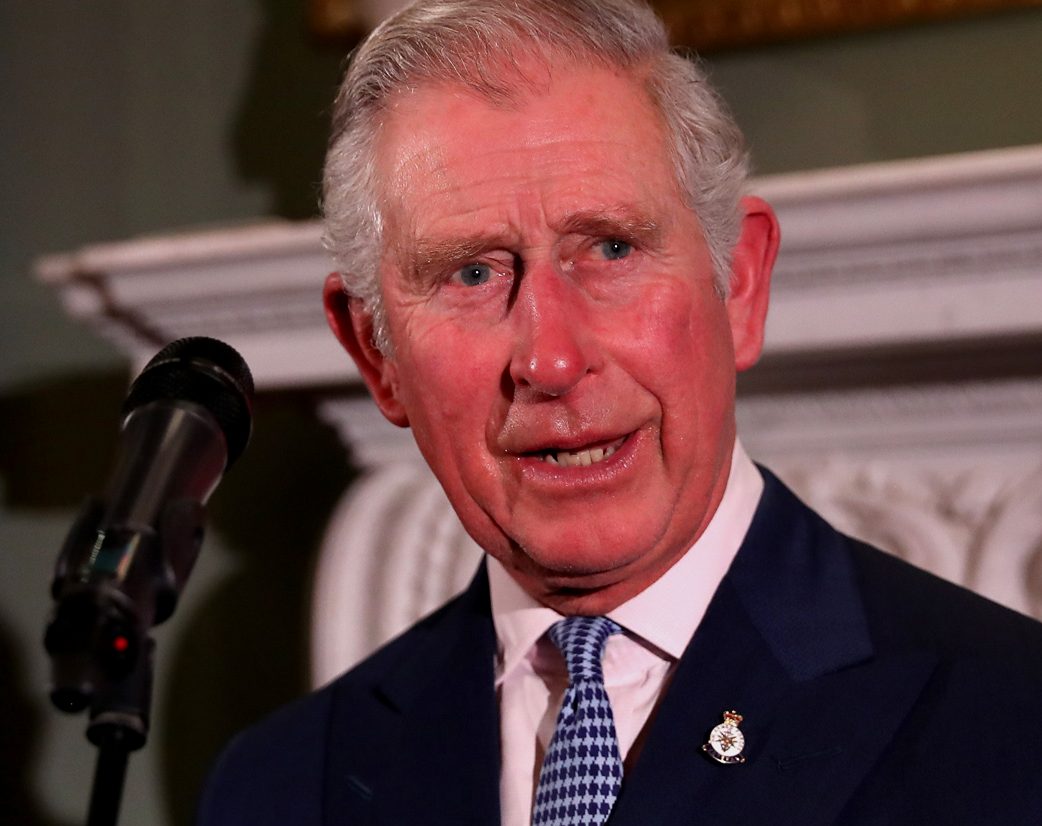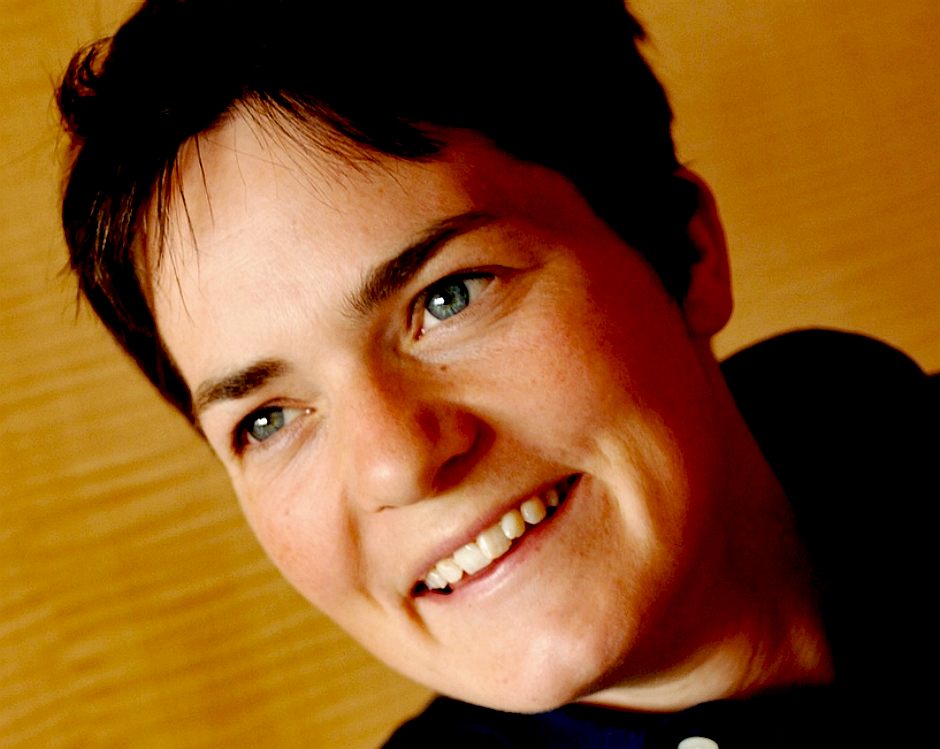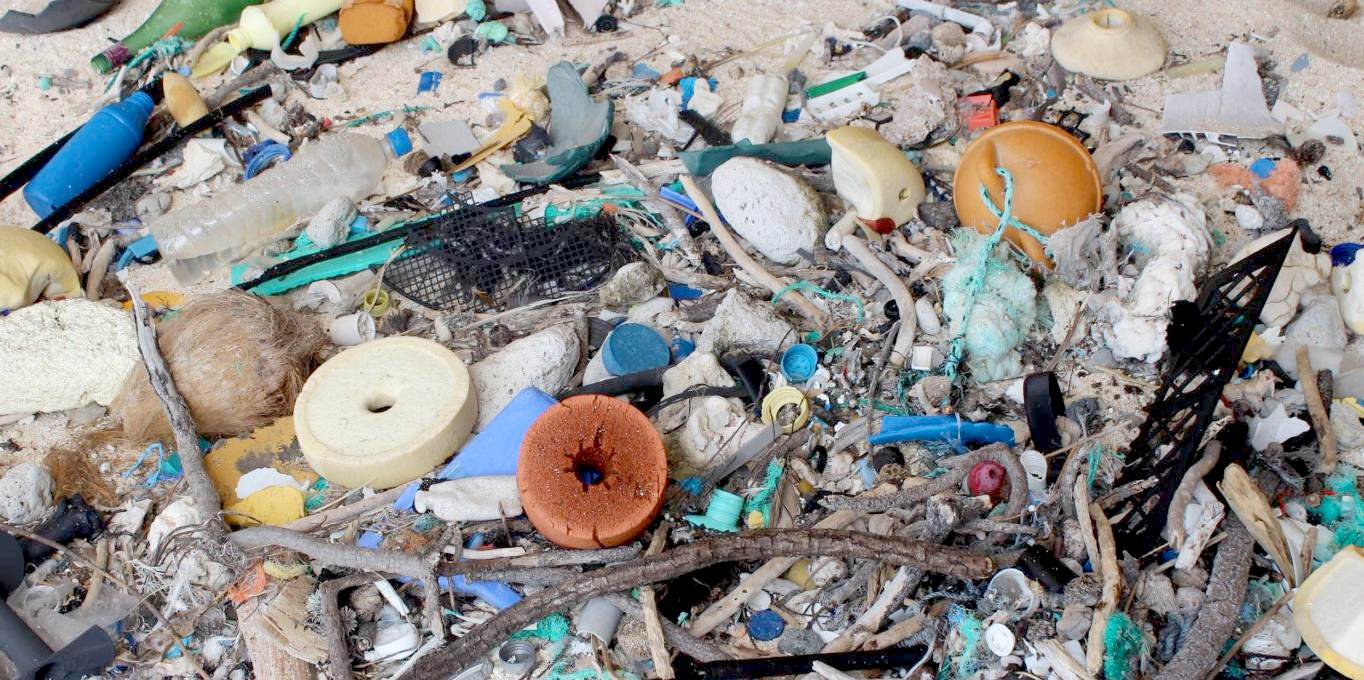|
PACKAGING
INNOVATION PRIZE
ABOUT -
CONTACTS - FOUNDATION -
HOME - A-Z INDEX


ELLEN
MACARTHUR FOUNDATION - MAY 18 2017 - PLASTIC ECONOMY
INNOVATION PRIZE
The Ellen MacArthur Foundation and The
Prince of Wales's International Sustainability Unit launch
a $2 million Innovation Prize to help keep plastics out the ocean.
The Ellen MacArthur Foundation, together with The Prince of Wales’s International Sustainability Unit, have today announced the launch of the $2
million New Plastics Economy Innovation Prize. The Prize which is funded by Wendy Schmidt as Lead Philanthropic Partner of the New Plastics Economy Initiative, calls for innovators,
designers, scientist and entrepreneurs to help create packaging that keeps
plastics out of the ocean.
The demand for plastics products is expected to double in the next 20 years – but the plastics system is broken. Only 14% of plastic packaging is recycled, with the remainder, worth $80-120
billion, lost as waste. Most plastic packaging items are used only once before being discarded, often ending up polluting the environment. If nothing changes, there could be more plastic than fish in the ocean by 2050. This new prize aims to keep plastics as valuable materials in the economy, and out of the ocean.
HRH The Prince of Wales, who has been a champion for the health and resilience of the ocean for over forty years, will deliver the keynote speech at the launch event. At a meeting earlier this year with business leaders, designers and material experts, The Prince emphasised the urgency of the need to re-think the global plastics system and highlighted the important role of innovation and design in the transition to a circular economy in order to stem the flow of plastics into the ocean.
John Kerry, former U.S. Secretary of State, who has provided a video address for the launch event, commented in support of the New Plastics Economy Innovation Prize: “Focusing on ocean health, focusing on an initiative to save the oceans could not be more timely and it could not be more critical.”
To achieve the goal of eliminating plastic packaging waste, the Prize is composed of two parallel challenges:
The $1 million Circular Design Challenge which invites applicants to rethink how we can get products to people without generating plastic waste. The Challenge will focus on small-format packaging items (10% of all packaging) such as shampoo sachets, wrappers, straws and coffee cup lids, which are currently almost never recycled and often end up in the environment. Anyone with a good idea for how to get products to people without using disposable packaging can enter this Challenge partnered by OpenIDEO.
The $1 million Circular Materials Challenge seeks ways to make all plastic packaging recyclable. About 13% of today’s packaging, such as crisp packets and food wrappers, is made of layers of different materials fused together. This multi-layer construction provides important functions like keeping food fresh, but also makes the packaging hard to recycle. The Challenge therefore invites innovators to find alternative materials that could be recycled or composted. The Challenge partner is NineSigma.
Innovators who apply to the Prize are competing for up to $2,000,000 in grants and visibility of their solutions to major businesses, the innovator community and the public. Winners will enter a 12-month accelerator programme offering exclusive access to industry experts, commercial guidance, feedback on user and scalability requirements, advice on performance expectations, and access to innovation labs for testing and development. The first winners will be announced later this year.
 
PRINCE
CHARLES & ELLEN
MACARTHUR: "We must find new ways to keep plastic out of our oceans."
I
NEWS 29 MAY 2017
When you sail non-stop around the world, you manage everything that you have onboard. You manage the energy in your batteries, you manage the food and water that you have. The boat, and everything it holds, is your own little finite world. And when you’re racing through those Southern Oceans, you are two and half thousand miles away from the nearest town, in iceberg territory.
If vital help needs to get to you, it’ll take five days for a ship to pick you up and then five days to steam you back to the next hospital. No experience will ever connect you more to the notion of what finite really means, because what you have on that boat really is all you have.
When you step off that boat you suddenly realise that the world that you have just
circumnavigated is no different: the global economy we all rely on is powered by finite resources, and we are slowly running out. And unlike for a race or a record attempt, this specific finish line is not something we can be looking forward to.
Changing the system
At the Ellen MacArthur Foundation, we have looked at some of the most important features of the modern industrial economy to see how we can change the system from a linear, one-way model, to a circular one that can work and deliver prosperity in the long run. One of those features is
plastic.
As plastic is cheap, light and practical, it’s all around us. A symbol of rising living standards and domestic bliss in the 1950s, the oil-based material has gradually attracted more criticism as volumes rose and problematic waste ensued.
Most plastic items are used only once before being discarded, often ending up polluting the environment. If nothing changes, there could be more plastic than
fish in the ocean by
2050.
Design failure
The big challenge now is to reconcile plastics’ undeniable functionality with a system that can work long-term, avoiding loss of material value and negative impacts. To fix today’s broken model, we have to fundamentally change the way we make and use plastics so that they don’t become waste in the first place.
A staggering 30 per cent of plastic packaging has nowhere else than landfill – or the environment – to go at the end of the line. Surely, that wasn’t the intention? Think about all these coffee lids, shampoo sachets or straws: they’re simply too small or too complex to be collected and recycled, and that signals a design failure.
We firmly believe that innovators, whether they’re designers, scientists, academics or entrepreneurs, have an essential role to play in building a plastics system that works – a New Plastics Economy.
That’s why on 18 May we have announced the launch of the $2 million New Plastics Economy Innovation Prize, whose single aim is to concentrate creative efforts around finding long-term solutions to the current issue.
INNOVATION PRIZE
Introducing two different $1 million challenges, the New Plastics Economy Innovation Prize invites everyone with a great idea to help keep plastic in the economy and out of the environment.
The Circular Design Challenge focuses on getting products to people without generating plastic waste, while the second pillar of the Innovation prize is the Circular Materials Challenge, and seeks ways to make all plastic packaging recyclable.
Re-setting the system will draw on everyone’s creativity, and we’re committed to making sure that no promising solution gets overlooked. There are ways to create economic value while phasing out negative impacts, and the New Plastics Economy Innovation Prize is designed to act as the initial spark leading to large-scale change.
By Ellen MacArthur
MEDIUM FEB 27 2017
- More Plastic than Fish in the Ocean by 2050: Report Offers Blueprint for
Change
Fon Mathuros, Head of Media, Member of the Executive Committee, World Economic Forum Geneva:
- Most plastic packaging is used only once; new report reveals that 95% of the value of plastic packaging material, worth $80 billion-$120 billion annually, is lost to the economy
- Report predicts that, on the current track, oceans will contain more plastic than fish by 2050 (by weight)
- Report offers vision for a global economy in which plastics never become waste, and a blueprint for the systemic change and collaboration needed to realize that vision
READ THE REPORT HERE
The current system by which we produce, use and dispose of plastics has important drawbacks: plastic packaging material with a value of $80 billion-$120 billion is lost each year. Aside from the financial cost, by 2050, on the current track, oceans are expected to contain more plastics than fish (by weight), according to a new report released today by the World Economic Forum and the
Ellen MacArthur Foundation, with McKinsey & Company as a knowledge partner, as part of Project MainStream. The New Plastics Economy: Rethinking the Future of Plastics provides for the first time a vision of a global economy in which plastics never become waste and outlines concrete steps towards achieving the systemic shift needed.
The report is underpinned by the principles of the circular economy — an economy that aims to keep materials at their highest value at all times. Assessing global plastic packaging flows comprehensively for the first time, the report finds that most plastic packaging is used only once; 95% of the value of plastic packaging material, worth $80 billion-$120 billion annually, is lost to the economy after a short first use. The New Plastics Economy, outlined in this report, envisages a fundamental rethink for plastic packaging and plastics in general — a new model based on creating effective after-use pathways for plastics; drastically reducing leakage of plastics into natural systems, in particular oceans; and finding alternatives to crude oil and natural gas as the raw material of plastic production.
“This report demonstrates the importance of triggering a revolution in the plastics industrial ecosystem and is a first step to showing how to transform the way plastics move through our economy. To move from insight to large-scale action, it is clear that no one actor can work on this alone. The public, private sector and civil society all need to mobilize to capture the opportunity of the new circular plastics economy,” said Dominic Waughray, Head or Public-Private Partnership, World Economic Forum
The report, produced as part of Project MainStream, a collaboration between the Ellen MacArthur Foundation and the World Economic Forum, with analytical support from McKinsey & Company, finds that the use of plastics has increased twentyfold in the past half-century and is expected to double again in the next 20 years. While plastics and plastic packaging are an integral part of the global economy and deliver many benefits, the report shows that their value chains currently entail significant drawbacks.
“Linear models of production and consumption are increasingly challenged by the context within which they operate — and this is particularly true for high-volume, low-value materials such as plastic packaging. By demonstrating how circular economy principles can be applied to global plastic flows, this report provides a model for achieving the systemic shift our economy needs to make in order to work in the long term,” said Dame Ellen MacArthur, Ellen MacArthur Foundation.
Achieving the systemic change needed to shift the global plastic value chain will require major collaboration efforts between all stakeholders across the global plastics value chain — consumer goods companies, plastic packaging producers and plastics manufacturers, businesses involved in collection, sorting and reprocessing, cities, policy-makers and NGOs. The report proposes the creation of an independent coordinating vehicle to set direction, establish common standards and systems, overcome fragmentation, and foster innovation opportunities at scale. In line with the report’s recommendations, the Ellen MacArthur Foundation will establish an initiative to act as a cross-value-chain global dialogue mechanism and drive the shift towards a New Plastics Economy.
“Plastics are the workhorse material of the modern economy — with unbeaten properties. However, they are also the ultimate single-use material. Growing volumes of end-of-use plastics are generating costs and destroying value to the industry. After-use plastics could — with circular economy thinking — be turned into valuable feedstock. Our research confirms that applying those circular principles could spark a major wave of innovation with benefits for the entire supply chain,” said Martin R. Stuchtey, McKinsey Center for Business and Environment.
The report’s findings are timely: knowledge and understanding of the circular economy among business leaders and policy-makers is growing, as demonstrated by the European Commission’s recent circular economy package and associated funding announcements; new technologies are unlocking opportunities in material design, reprocessing and renewable sourcing; developing countries are investing in after-use infrastructure; and governments are increasingly considering — and implementing — policies around plastic packaging.
The New Plastics Economy: Rethinking the Future of Plastics report was produced by the World Economic Forum and Ellen MacArthur Foundation as part of Project MainStream, a multi-industry, global initiative launched in 2014. Analytical support was provided McKinsey & Company, and financial support by the MAVA Foundation. MainStream is led by the chief executive officers of nine global companies: Averda, BT, Tarkett, Royal DSM, Ecolab, Indorama, Philips, SUEZ and Veolia. Frans van Houten, Chief Executive Officer of Philips, is chairman of the leadership group. It focuses on systemic stalemates in global material flows that are too big or too complex for an individual business, city or government to overcome alone, as well as on enablers of the circular economy such as digital technologies.
Over 2,500 leaders from business, government, international organizations, civil society, academia, media and the arts will participate in the 46th World Economic Forum Annual Meeting in Davos-Klosters, Switzerland, on 20–23 January. Under the theme, Mastering the Fourth Industrial Revolution, the programme comprises over 250 sessions, of which over 100 will be webcast live.
Taking a formative role in shaping the discussion at the Annual Meeting 2016 as the Co-Chairs are: Mary Barra, Chairman and Chief Executive Officer, General Motors, USA; Sharan Burrow, General Secretary, International Trade Union Confederation (ITUC), Brussels; Satya Nadella, Chief Executive Officer, Microsoft Corporation, USA; Hiroaki Nakanishi, Chairman and Chief Executive Officer, Hitachi, Japan; Tidjane Thiam, Chief Executive Officer, Credit Suisse, Switzerland; and Amira Yahyaoui, Founder and Chair, Al Bawsala, Tunisia.
CONTACTS
Ellen MacArthur Foundation
The Sail Loft
42 Medina Road
Cowes
Isle of Wight
PO31 7BX
United Kingdom
T +44 (0) 1983 296463
Charity Registration No.: 1130306
OSCR Registration No.: SC043120
Company No.: 6897785

LINKS
& REFERENCE
Ellenmacarthurfoundation-and-the-prince-of-waless-international-sustainability-unit-launch-2-million-innovation-prize-to-keep-plastics-out-the-ocean
standard.co.uk/news/uk/prince-charles-urges-businesses-to-discourage-buy-use-throw-away-mentality-and-promote-regeneration
wef.ch/plasticseconomy
medium.com/world-economic-forum/more-plastic-than-fish-in-the-ocean-by-2050-report-offers-blueprint-for-change
inews.co.uk/opinion/columnists/ellen-macarthur-must-find-new-ways-keep-plastic-oceans
Express
UK news royal prince charles dame ellen macarthur plastic waste contest
http://www.express.co.uk/news/royal/806243/prince-charles-dame-ellen-macarthur-plastic-waste-contest
http://www.standard.co.uk/news/uk/prince-charles-urges-businesses-to-discourage-buy-use-throw-away-mentality-and-promote-regeneration-a3457121.html
http://wef.ch/plasticseconomy
https://medium.com/world-economic-forum/more-plastic-than-fish-in-the-ocean-by-2050-report-offers-blueprint-for-change-3b22cd497a46
https://inews.co.uk/opinion/columnists/ellen-macarthur-must-find-new-ways-keep-plastic-oceans/

THE
INDEPENDENT HENDERSON ISLAND - Beaches of a remote British island in the South Pacific are littered with an estimated 37.7 million pieces of plastic, scientists have discovered.
This
website is provided on a free basis as a public information
service. copyright © Cleaner
Oceans Foundation Ltd (COFL) (Company No: 4674774)
May 2017. Solar
Studios, BN271RF, United Kingdom.
COFL
is a charity without share capital.
|



